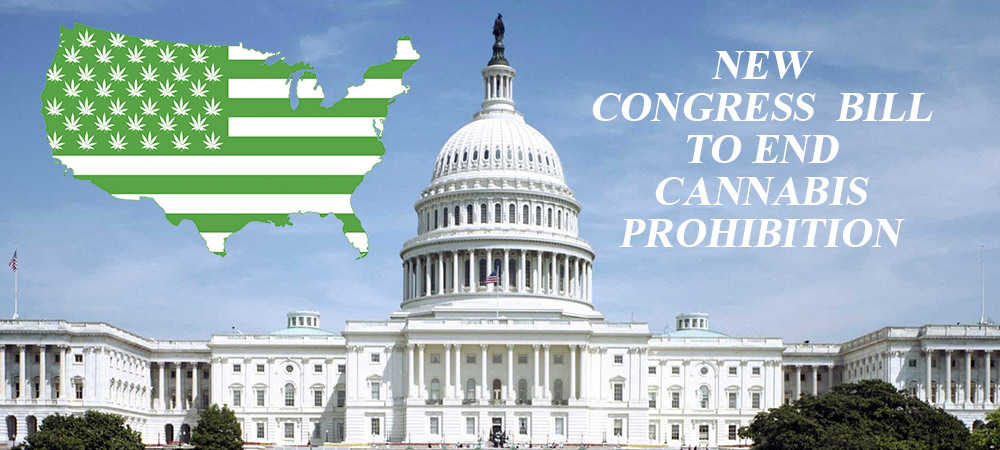United States Congress Holds Historic Hearing On Cannabis Legalization – If You Can’t Beat Them, Join Them!
On July 10, 2019 the House Judiciary Committee lead by Chairman Jerrold Nadler (D-NY) delivered the following opening remarks during a Subcommittee on Crime, Terrorism, and Homeland Security hearing on “Marijuana Laws in America: Racial Justice and the Need for Reform” which also appears in his press release issued after the hearing:
“Marijuana is one of the oldest agricultural commodities not grown for food, and it has been used medicinally all over the world since at least 2700 B.C., but its criminalization is a relatively recent phenomenon.
The use of marijuana, which most likely originated in Asia, later spread to Europe, and made its way to the Americas when the Jamestown settlers brought it with them across the Atlantic. The cannabis plant has been widely grown in the United States and was used as a component in fabrics during the middle of the 19th century. During that time period, cannabis was also listed in the United States Pharmacopeia as a treatment for a multitude of ailments, including muscle spasms, headaches, cramps, asthma, and diabetes.
It was only in the early part of the 20th century that marijuana began to be criminalized—mainly because of misinformation and hysteria, based at least in part on racially biased stereotypes connecting marijuana use and minorities, particularly African Americans and Latinos. Unfortunately, the same racial animus motivating enactment of these laws also led to racially disproportionate enforcement of such laws, which has had a substantial, negative impact on minority communities.
The collateral consequences of conviction for marijuana possession—and even sometimes for a mere arrest—can be devastating. For those saddled with a criminal conviction, it can be difficult or impossible to vote, to obtain educational loans, to get a job, to maintain a professional license, to secure housing, to receive government assistance, or even to adopt a child.
These exclusions create an often-permanent second-class status for millions of Americans. This is unacceptable and counterproductive, especially in light of the disproportionate impact that enforcement of marijuana laws has had on communities of color.
It is not surprising, therefore, that over the past two decades, public support for legalizing marijuana has surged. States have led the way with reforms, and presently, medicinal or recreational marijuana use is legal in 33 states and the District of Columbia. However, our federal laws have not kept pace with the obvious need for change.
In my view, applying criminal penalties, with their attendant collateral consequences for marijuana offenses is unjust and harmful to our society. The use of marijuana should be viewed instead as an issue of personal choice and public health.”
Federal Law Makes Marijuana Illegal
Under Federal law (Controlled Substances Act 21 U.S.C. 801) marijuana is designated as a Schedule I controlled substance due to the historical belief that it has a high potential for abuse, no currently accepted medical use in treatment, and lack of accepted safety for use under medical supervision.
The federal penalties for possession of any amount of marijuana are as follows:
- First Offense – Misdemeanor involving up to one year of incarceration and $1,000 in fines
- Second Offense – Misdemeanor punishable by 15 days to 2 years behind bars and $2,500 in fines
- Third and subsequent offenses – Misdemeanor or felony punishable by 90 days to 3 years of incarceration and fines of up to $5,000.
The penalties for the sale of marijuana depend on the amount of marijuana you have been accused of selling or attempting to sell:
- Less than 50 kilograms – Felony punishable by up to 5 years in prison and/or up to $250,000 in fines
- 50 to 99 kilograms – Felony punishable by up to 20 years in prison and/or fines of up to $1,000,000
- 100 to 999 kilograms – Felony involving 5 to 40 years incarceration and/or fines of up to $2,000,000
- 1000 kg and up – Felony carrying a sentence of 10 years to life in prison and/or up to $4,000,000 in fines
As for the cultivation of marijuana, the federal authorities punish it on the basis of the number of plants you were caught growing:
- Less than 50 plants – Felony punishable by up to 5 years in prison and/or up to $250,000 in fines
- 50 to 99 plants – Felony punishable by up to 20 years in prison and/or up to $1,000,000 in fines
- 100 to 999 plants – Felony carrying a 5 to 40-year prison sentence and/or fines of up to $5,000,000
- 1,000 plants or more – Felony involving 10 years to life in prison and/or fines of up to $10,000,000
With aggravating factors such as a trafficking activity that results in an injury or death, a sale within 1,000 feet of a school, or a case involving five grams sold to a minor, the above penalties may increase dramatically.
How things have changed –
Medical marijuana is legal in 33 states.
The medical use of cannabis is legal (with a doctor’s recommendation) in 33 states and Washington DC. Those 33 states being Alaska, Arizona, Arkansas, California, Colorado, Connecticut, Delaware, Florida, Hawaii, Illinois, Maine, Louisiana, Maryland, Massachusetts, Michigan, Minnesota, Missouri, Montana, Nevada, New Hampshire, New Jersey, New Mexico, New York, North Dakota, Ohio, Oklahoma, Oregon, Pennsylvania, Rhode Island, Utah, Vermont, Washington and West Virginia. The medical use of cannabis is also legal in the territories of the Northern Mariana Islands, Guam and Puerto Rico.
Recreational marijuana is legal in 10 states.
Ten states and Washington DC, have legalized marijuana for recreational use — no doctor’s letter required — for adults over the age of 21. Those ten states being Alaska, California, Colorado, Maine, Massachusetts, Michigan, Nevada, Oregon, Vermont and Washington and the territory of Guam.
Department Of Justice preferring cannabis legalization.
Attorney General William Barr stated that he would prefer that Congress enact legislation allowing states to legalize marijuana instead of continuing the current approach under which a growing number of states have ended cannabis prohibition in conflict with federal law.
Higher Taxes Still Remain
While the developments listed above are favorable for cannabis business, it still remains to be seen when favorable changes will be made to the Internal Revenue Code which treats businesses in the marijuana industry differently resulting in such business paying at least 3-times as much in taxes as ordinary businesses.
Generally, businesses can deduct ordinary and necessary business expenses under I.R.C. §162. This includes wages, rent, supplies, etc. However, in 1982 Congress added I.R.C. §280E. Under §280E, taxpayers cannot deduct any amount for a trade or business where the trade or business consists of trafficking in controlled substances…which is prohibited by Federal law. Marijuana, including medical marijuana, is a controlled substance. What this means is that dispensaries and other businesses trafficking in marijuana have to report all of their income and cannot deduct rent, wages, and other expenses, making their marginal tax rate substantially higher than most other businesses.
Reporting Of Cash Payments Still Remain
The Bank Secrecy Act of 1970 (“BSA”) requires financial institutions in the United States to assist U.S. government agencies to detect and prevent money laundering. Specifically, the act requires financial institutions to keep records of cash purchases of negotiable instruments, and file reports of cash purchases of these negotiable instruments of more than $10,000 (daily aggregate amount), and to report suspicious activity that might signify money laundering, tax evasion, or other criminal activities. The BSA requires any business receiving one or more related cash payments totaling more than $10,000 to file IRS Form 8300, Report of Cash Payments Over $10,000 Received in a Trade or Business.
The minimum penalty for failing to file EACH Form 8300 is $25,000 if the failure is due to an intentional or willful disregard of the cash reporting requirements. Penalties may also be imposed for causing, or attempting to cause, a trade or business to fail to file a required report; for causing, or attempting to cause, a trade or business to file a required report containing a material omission or misstatement of fact; or for structuring, or attempting to structure, transactions to avoid the reporting requirements. These violations may also be subject to criminal prosecution which, upon conviction, may result in imprisonment of up to 5 years or fines of up to $250,000 for individuals and $500,000 for corporations or both.
Marijuana-related businesses operate in an environment of cash transactions as many banks remain reluctant to do business with many in the marijuana industry. Like any cash-based business the IRS scrutinizes the amount of gross receipts to report and it is harder to prove to the IRS expenses paid in cash. So it is of most importance that the proper facilities and procedures be set up to maintain an adequate system of books and records.
How Do You Know Which Cannabis Tax Attorney Is Best For You?
Given that cannabis is still illegal under existing Federal law you need to protect yourself and your marijuana business from all challenges created by the U.S. government. While cannabis is legal in California, that is not enough to protect you. It’s coming down that the biggest risk is TAXES. So it is best to be proactive and engage an experienced cannabis tax attorney in your area who is highly skilled in the different legal and tax issues that cannabis businesses face. Let the cannabis tax attorneys of the Law Offices Of Jeffrey B. Kahn, P.C. located in Orange County (Irvine), the Inland Empire (Ontario and Palm Springs) and other California locations protect you and maximize your net profits.






